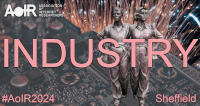TAPPING THE "UNTAPPED RESOURCE": HOW TWENTIETH-CENTURY INDUSTRIAL PRIORITIES HAVE SHAPED CONTEMPORARY NEW MEDIA ART PRACTICES
DOI:
https://doi.org/10.5210/spir.v2024i0.14072Keywords:
new media art, Big Tech, industry, culture, controlAbstract
Contemporary artists using emerging technologies in their work are often positioned as innovators, mavericks, and diagnosticians, who work “outside” of the tech industry and thus bring sorely needed perspective to its developments. However, viewing new media artists as fully independent actors, devoid of any connection to industrial and corporate aims, serves to eclipse the long-standing and substantial ties that the field has to the protocols and priorities of the mainstream technology industry. These, in fact, have existed for as long as artists have attempted to integrate computation, electronics, networking, or other high-tech components into their work—both when these tools are owned and operated by corporations, but also in more diffuse, ideological ways. This contribution, which draws from my larger dissertation work, traces the evolution of the cultural imaginary surrounding new media artists, defined in my research as practitioners who expand, reinvent, or misuse technological expression. By explicitly placing archives from three twentieth century “art and technology” initiatives against interviews with new media artists and cultural workers I conducted in the present day, I emphasize the foundational connections that new media artists have to industrial practices—and argue that this relationship can be traced back to the first attempts to place artists into collaborations with industry. As a result, industrial mandates have, to a large degree, shaped the popular conception of the new media art field, guiding both the practicalities of working with digital systems as well as notions of what artists “should” be doing with their work.Downloads
Published
2025-01-02
How to Cite
Vasudevan, . R. (2025). TAPPING THE "UNTAPPED RESOURCE": HOW TWENTIETH-CENTURY INDUSTRIAL PRIORITIES HAVE SHAPED CONTEMPORARY NEW MEDIA ART PRACTICES. AoIR Selected Papers of Internet Research. https://doi.org/10.5210/spir.v2024i0.14072
Issue
Section
Papers V

